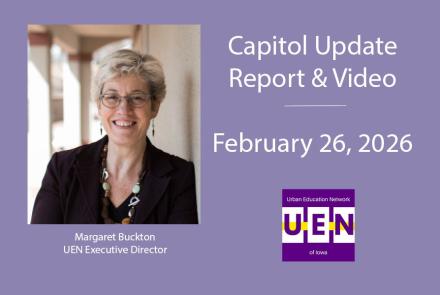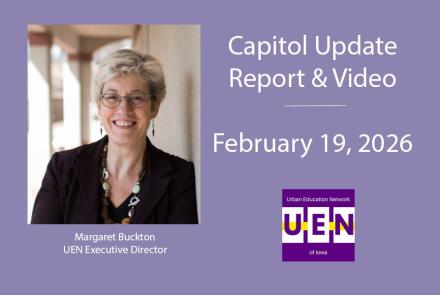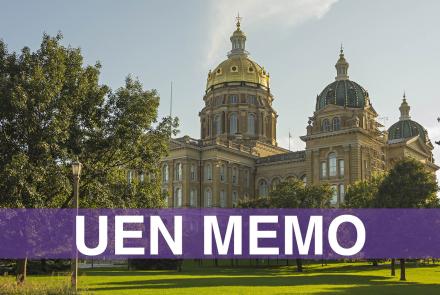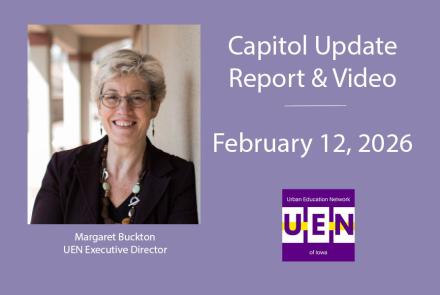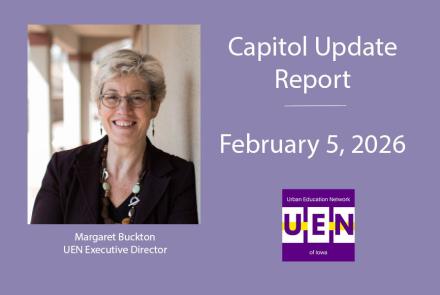Capitol Update - February 2, 2023
UEN Legislative Update
Feb. 2, 2023
Download the Printable February 2, 2023 UEN Legislative Update
In this UEN Weekly Report from the 2023 Legislative Session, find information about:
- School Funding: SSA bills through the Senate SF 192 and in the House HF 171
- HF 5 Transparency (Instructional Materials and Library Books)
- SF 181 Property Valuation Correction
- HSB 118 and SSB 1111 IASB Code Clean-up and Regulation Modernization Bill
- SSB 1076 Flexibility: Annotated Version Available
- Subcommittee and Committee Action on Other Bills and Bills Introduced
- Advocacy Action Steps for This Week: Key Messages on School Funding
- Links to Advocacy Resources
- Members of Important Education Committees
School Funding: SSA Bills through the Senate and in the House
SF 192 SSA was approved by the Senate on Thursday, setting a 3% increase in the State Cost per Pupil. The bill was approved 34:15. (Formerly SSB 1081.) The following information comes from the LSA Fiscal Note:
The bill has three provisions with a fiscal impact:
- Establishes a 3.00% State percent of growth rate to be applied to the State cost per pupil (SCPP) for FY 2024, for an SSA of $222 per pupil.
- Establishes a 3.00% State percent of growth rate to be applied to each of the State categorical cost per pupil amounts for FY 2024.
- Provides additional property tax replacement funding based on the per pupil increase that results from the establishment of the State percent of growth in FY 2024. The Bill requires the additional levy portion of the FY 2024 SCPP amount to be frozen at $685 per pupil, regardless of the per pupil increase for FY 2024.
The FY 2024 dollar amounts in the third column of the following chart (FY 2024 Supplemental State Aid) will be added to each district’s (and AEA’s) per pupil amounts from FY 2023:

The same process applies to per pupil categoricals, with the dollar amounts from the FY 2024 Supplemental State Aid column added to the district’s (and AEA’s) FY 2023 per pupil amounts. Teacher Leadership and Compensation (TLC) is the only per pupil categorical amount consistent across districts.
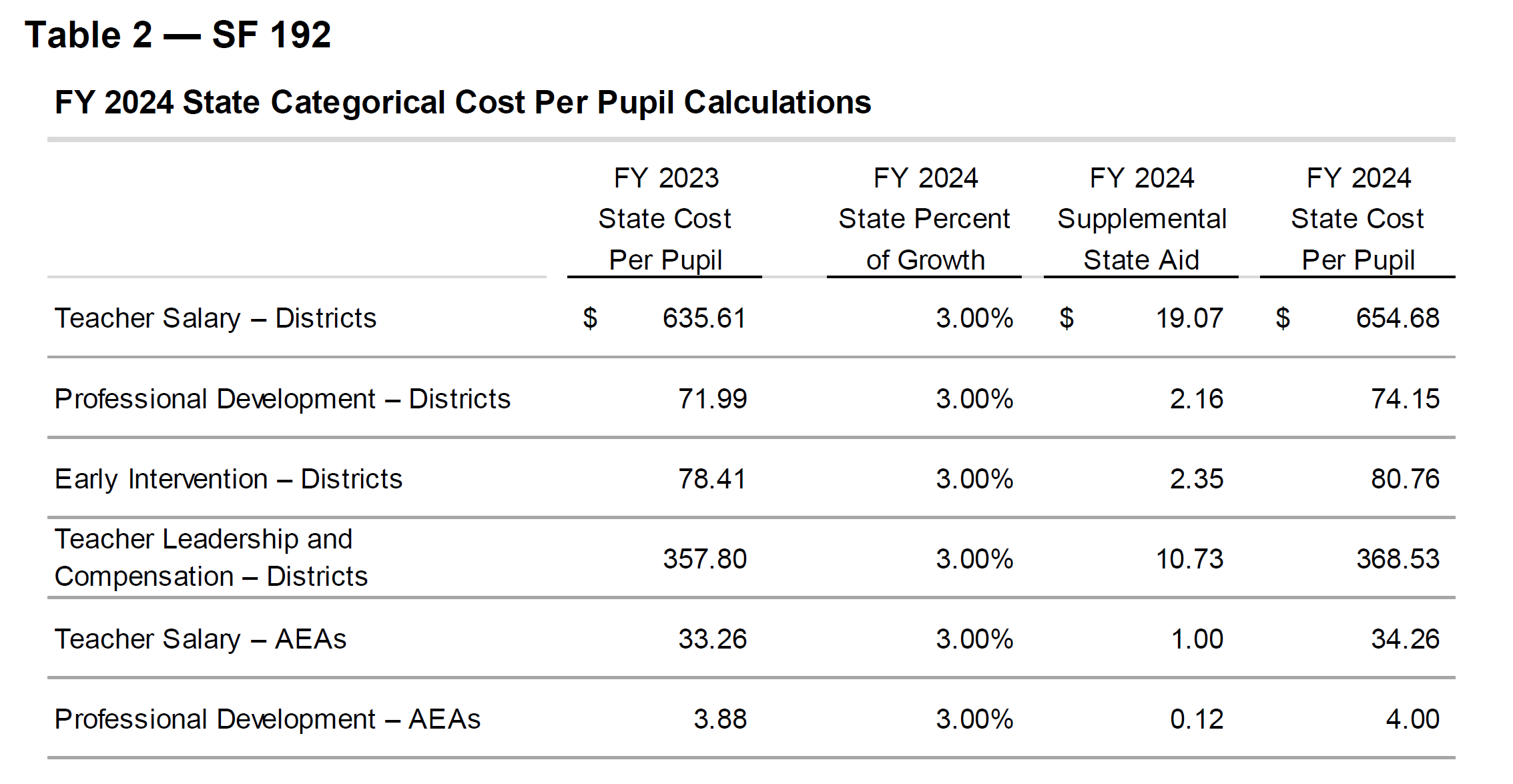
The following table shows the fiscal impact to the state general fund and property taxpayers. Note the $114.3 million increase in state aid, which includes $17.1 million more for AEAs. That is typically removed in the standings appropriations bill at the end of Session. The state amount would then drop to $97.3 million. Additionally, SF 181 Property Tax Error Correction detailed below would also change both the state total (increase) and the local property tax total (decrease) if enacted (and it will be).
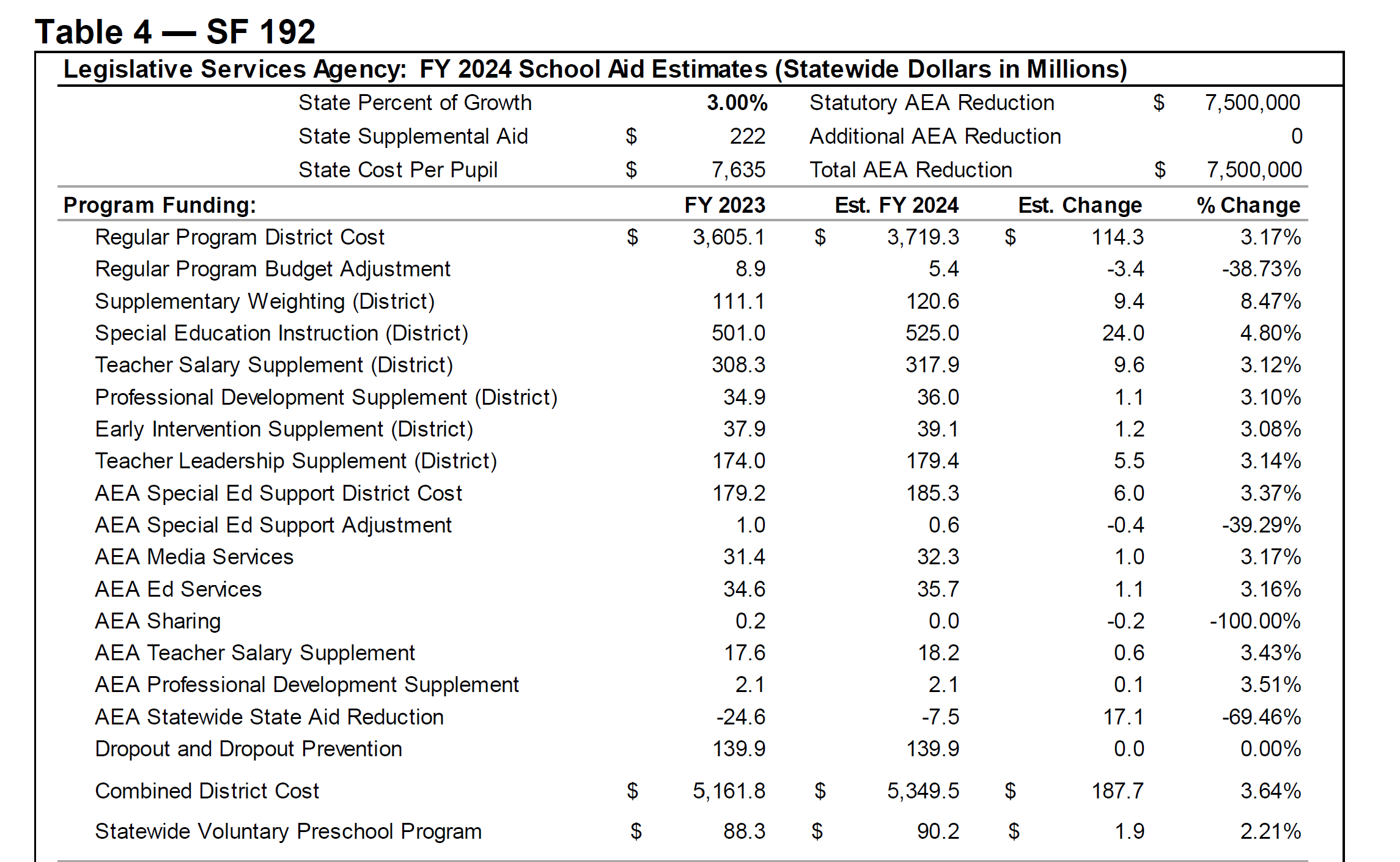
In this next section of Table 4, the Property Tax Relief Payment (PTRP) grows at 15.43% or $15.3 million of the total State Aid amount. Additional excess from the state penny for school infrastructure, also known as SAVE, and the Foundation Base Supplement (FBS) are also property tax relief. Note the total percent change of state vs. local money.
Table 4 Continued:
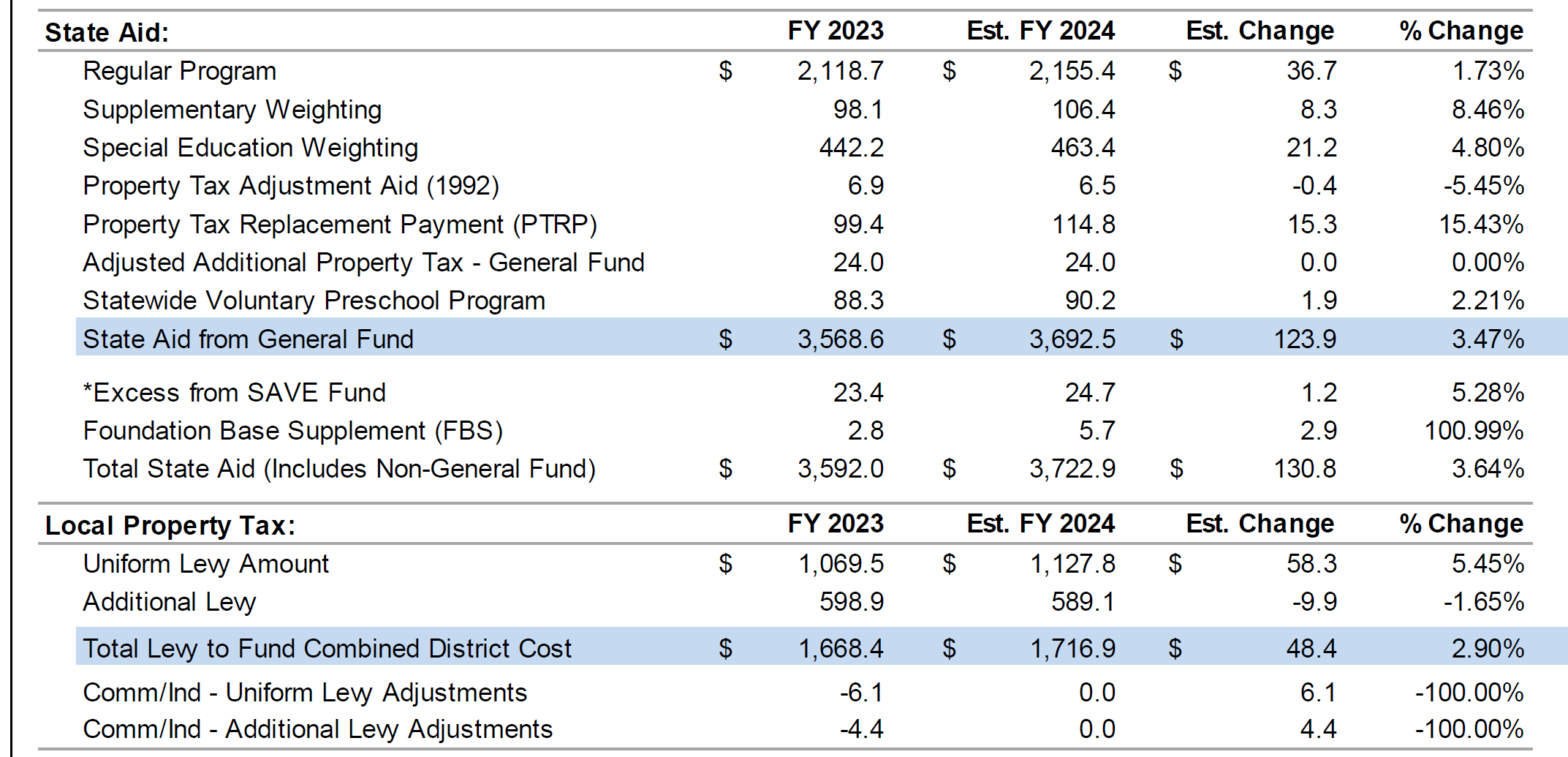
This last section of Table 4 from the Fiscal Note provides additional information: 3% SSA leaves 71 districts on budget guarantee. The Statewide AEA funding is likely overstated if they make cuts in the appropriations process. Lastly, the transportation equity fund grows by the SSA rate of 3%.
What is not in this bill? In the last several years, the Senate has insisted on a small amount (either $5 or $10 per pupil) to continue to close the gap in differences between the state cost per pupil and higher district costs per pupil. The current gap is $140 per pupil. There are 224 districts at the state minimum and 103 at a higher DCPP. Closing this formula gap over the next eight years is a priority of the UEN. Additional Transportation Equity funding has also been included by the Senate in years past, with an amount sufficient to reimburse all districts down at least to the state average.
UEN Position: UEN was registered as undecided on the bill. We were registered opposed to SSB 117, its predecessor, which set the increase at 2%. The Governor recommended 2.5%. This 3% level matches the House and is the highest of the three proposals. We will continue to advocate for additional resources through the appropriations process. Several on our list include funding the $10 million high-needs school grants, originally appropriated in Governor Brandstad’s education reform act of 2013. This funding is in the Iowa Code as a standing appropriation, but has been pushed out on year in the standings bill, every year since. With higher poverty, English-language learner, and minority populations, and corresponding achievement challenges, we would anticipate many urban schools would qualify for that assistance. Full-day preschool, with a 1.0 weighting, for needy students is also on our list. A poverty factor in the formula, likely a longer-term goal, is also something to mention when talking to legislators. Lastly, additional resources or flexibility among the resources schools have, would both be welcome to assist with cyber security costs, staff, and training, and teacher recruitment and retention programs. The FY 2024 increase of 3% per pupil is the second highest in 14 years.
HF 5 Transparency for Instructional Materials, Library Books and Civics Test: this bill builds on HF 2577 Transparency/ Civics which was passed by House in the 2022 Session. The bill:
Enforcement Provisions
- Requires the State Board of Education to institute sanctions (such as withholding state foundation aid) if an accreditation noncompliance s not resolved, after having an opportunity to correct, within 14 days. (Changes “may” to “shall”). This applies to all accreditation noncompliance issues, not just transparency provisions. UEN requested during the subcommittee that the bill be amended back to “may” to allow the state BOE discretion for extenuating circumstances, such as a cyber security attack or other situation preventing timely correction.
- Requires a civil penalty shall be assessed against the school district if noncompliance of transparency provisions is not corrected within 14 days, from $500 to $5000. Again, we asked for state BOE and DE discretion.
- Requires DE to notify Board of Education Examiners (BOEE) if a licensed individual violated this section leading to an enforcement action.
- Applies the transparency provisions to Charter schools (but not private schools)
Definition of Instructional Materials
- Printed or electronic textbooks and related core materials written and published primarily for use in elementary or secondary instruction and required by the state or the local school board.
- Specifically excludes lesson plans. During subcommittee, we also suggested assessments be exempt from the definition.
- States that this section shall not be construed to require the school district to reproduce educational; materials that were not created by a teacher employee or distribute any educational materials in a manner that would infringe on intellectual property rights.
Professional Development Reporting and Special Education Exemption
- Requires the district to publish on their website information related to the training and PD courses and programs offered by the CSD in which employees participated during the current school year. (UEN requested this requirement change to reporting PD that was required by the school district.)
- Exempts teacher of record from having to post materials for students receiving special education services.
Deadlines for Instructional Materials Compliance
- Requires that compliance with the above is satisfied by July 1, 2025 by giving parents view-only access to materials on the classroom management software system used by the district.
- If materials are modified during the year, must be posted by the end of the school week in which they were modified. Participants in the Subcommittee requested additional time in case the materials were used later in the week making timely posting more difficult.
Library Book Transparency
- Requires procedures to request reconsideration or removal of library materials.
- Requires board policy and includes timelines.
- Also allows a parent to request their child not access specific materials.
Civics Test in High School Government Class
- Requires the Immigration and Naturalization Services test required of citizenship be given to students as the assessment for the half unit of U. S. Government in High School.
- Requires districts to report scores annually to the DE, but does not require the test for graduation. Does not require the DE to compile a report.
- UEN asked for clarification regarding making accommodations for students with disabilities or translation for non-English-speaking students. We also requested that the bill state that the test is required (if it has to be) rather than referring to it as “the assessment” for the class. School districts may have other assessments or projects that would constitute a confirmation that students mastered the standards required.
This bill was discussed in the Subcommittee of Reps. Stone, Fry and Ehlert. Rep. Stone said the bill will move forward to the House Education Committee, but they would consider the input given in subcommittee for possible amendments. UEN is registered as undecided on the bill.
SF 181 Property Valuation Calculation Correction: this bill provides a process to correct an error which improperly valued some property. Regarding assessment, the bill excludes various properties (mobile/manufactured home parks and communities, assisted living facilities and portions of commercial properties including room for three or more dwelling units) from assessment limitations related to residential and agricultural property rollbacks. The bill requires the Department of Revenue to certify, within 2 days of the effective date of the bill, to county auditors, the assessment value for taxation and the rollback to be used. The bill delays the due date for budget certification for all local governments, including schools, to April 30, 2023. The bill also specifies the different taxes for which the Employer Childcare Tax Credit can be used and specifies that no withholding is required for retirement income that is not taxed. The bill was amended and passed by the Senate Ways and Means Committee 17:1 and amended and passed by the full Senate on Thursday, 48:0. It is assigned to a Subcommittee of Reps. Kaufmann, Bloomingdale, Forbes, Harris and Jacoby, with a meeting scheduled for Feb. 6 at 11:00. UEN is monitoring the bill.
SSB 1111/HSB 118 IASB Code Clean-up and Modernization Bill. These companion bills introduced in the Senate and House Education Committees, respectively, include the following:
Division I: Bond Sales
Section 1: Notice of Sale: allows districts to list bond sales in a national media outlet used by bond buyers or their county newspaper
Section 2: Electronic Bidding: gives boards the flexibility in how they handle bids received to purchase bonds. Boards would have the option to accept only electronic bids, which is the primary method the bond market uses.
Division II: School Board Officers – Duties and Responsibilities
Section 3. School librarians: maintains the requirement that schools have a qualified teacher librarian but eliminates outdated code language inserted into code when this requirement was first instituted.
Sections 4-5. School board vacancies: allows a district to publish notice of its intent to fill a vacancy on either the district’s website or in the newspaper of general circulation. This additional flexibility provides more timely notification and saves taxpayer dollars.
Section 6. General rules – bonds of employees: eliminates language requiring boards to have rules for loading and unloading of students during inclement weather. This language is not appropriate here and is already covered in 285.1 which requires boards to establish policy for the transportation of students.
Section 7: Superintendent – term – employment of support personnel: allows the superintendent to use electronic signatures on contracts or use faxed copies of contracts to hire personnel if the board approves a policy.
Section 8: Background check fees: allows a district to charge an existing employee the cost of the background check which is required every 5 years after employment. Current law already allows districts to charge this amount to teachers. This change aligns with that code section and gives districts local control to determine whether to charge. Background checks range from $20 - $40 depending on the level of detail.
Section 9: Display of United States Flag and Iowa State Flag – Pledge of Allegiance: clarifies that the school district will recite the pledge, not the board members. It is more appropriate that this be the district’s responsibility.
Section 10: President – Duties: allows the use of electronic signatures by the board president and/or superintendent.
Section 11: President, Secretary and Treasurer of Board – Oath: eliminates code language 1862 that required school board members to take out surety bonds. This was a time when there was little surety in the insurance market and policies weren’t as well backed as now. In addition, school board members no longer directly touch money.
Division III: Responsibilities and requirements related to health
Section 12: Environmentally friendly cleaning products: eliminates the requirement that school districts evaluate the use of environmentally friendly cleaning products, makes it easier for local boards/districts to make decisions about the products they use and eliminates the requirement that they use environmentally preferable cleaning products without notifying the DE of the decision to use other products.
Section 13. School nurses: maintains the requirement that districts hire a school nurse but eliminates the goal language of one nurse for every 750 students enrolled in the district.
Section 14. Vision cards: eliminates the requirement that the DE and districts provide a vision screening card to districts to be distributed to students. 135.39D already requires DPH to provide guidance on appropriate screening tools. This is a redundant requirement that is specific to one organization.
Section 15. Department of Education – healthcare-related training: creates a work group to examine how to prioritize and consolidate healthcare-related training to help reduce the amount of training time negatively impacting instruction time for students.
Division IV: Statewide School Infrastructure
Section 16 - 20: Use of Revenues
- Eliminates outdated language as there are no longer outstanding revenue bonds issued under the local option sales tax for school infrastructure and ensures that the default in a school reorganization if a new revenue purpose statement is not approved is to pay off existing bonds, not go to property tax relief. (Sec. 16)
- Deletes language on joint projects with community colleges, moving the language to the definition of school infrastructure in 423F.3(6) to clarify in the definition of school infrastructure. (Sec. 17)
- Conforming change with the elimination of the language per Section 16. (Sec. 18)
- Moves language from 423E.1 to clarify the definition of school infrastructure. (Sec. 19)
- Adds two paragraphs (transferred from 423E) to define school infrastructure but does not change any other existing definitions of school infrastructure in 423F (Sec. 20)
Section 21: Borrowing Authority for School Districts: The changes to this code section accomplish multiple things:
- Changes the code section to clarify that the ability to issue bonds is guided by 423F
- Eliminates the reference to 423E as that section is repealed on June 30, 2023
- Exempts districts from holding a public hearing on the refinancing on revenue bonds to allow for districts to garner the best interest rate and save taxpayer funds.
- Ensures that the repeal of 423E does not affect the validity of any outstanding bonds or debt.
- Moves the exact language from 423E.5 that authorizes districts to issue revenue bonds and moves it to 423F as 423E is repealed as of June 30, 2023. Also adds the ability to enter into agreements with a city, county community college or another school district.
Division V: County Conference Board
Section 22: Conference Board: ensures that school boards have adequate representation on the county conference board by allowing any elected school board member to participate in the conference board as is the case with representatives of counties.
Division VI: Children’s Residential Facilities
Section 23: ensures that residential child facilities must also submit Medicaid documents to the home (resident) school district of the child so the home district can submit for reimbursement and reduce the burden on local property taxpayers.
Division VII: Area Education Agency Boards – Posting of Notice of Proposed Budget
Section 24. AEA budgets: gives AEAs the flexibility to publish their proposed budgets on their website or in the newspaper of general circulation, eliminating the requirement that each AEA publish their proposed budget in each county in their service territory. The 9 AEAs now publish in 90 newspapers (may be some overlap) costing nearly $11,000.
Division VIII: Election Commissioners
Section 25: Election Dates – Conflicts – Public Measures: clarifies that the controlling county in a school board special election makes the determination of placing an item on the ballot.
UEN is registered in support of this bill, now in the Senate and House Education Committees.
Chapter 12 Flexibility: Annotated Version Available
SSB 1076 Education Standards Flexibility: this bill, detailed in the Jan. 26 Weekly Report, is very detailed. An annotated version of the bill, with side-by-side bill text and explanations, is available on the UEN website here: Chapter 12 SSB 1076 Annotated. UEN is registered in support.
Committee and Subcommittee Action
HF 134 Open Enrollment Transportation (Formerly HF 41): strikes requirements that a sending and receiving district agree to arrangements for transportation for an open-enrolled student and allows the receiving district to go into the resident district to transport students. See SF 29. Approved by the Education Committee 19:4. Now on the House Calendar. UEN is registered opposed.
Bills Introduced
HF 100 BOEE Licensing Age: strikes the requirement that an applicant for a BOEE license be 21. The bill is assigned to the House Education Committee. A subcommittee met and recommended the bill move forward to the full House Education Committee. UEN is registered in support.
HF 101 Your Iowa Crisis Numbers: requires public schools that service students in grades 7-12 that issue ID cards to include the Your Iowa Crisis telephone and text numbers. Applies to IDs issued after the effective date of the bill but requires schools to use existing IDs until that supply is exhausted. A subcommittee met and recommended the bill move forward to the full House Education Committee with amendment. UEN requested the bill allow but not mandate districts to use their existing card stock. UEN is registered as undecided.
HF 152 Rural School Security Grants: appropriates $4 million for a rural school security grant program. Districts with at least 1,000 may apply. DE develops criteria and administers the grant. Schools can apply to receive up to $20,000 for salary and benefits of a school resource officer (SRO). School districts may share with others and receive operational sharing incentives. The bill is in the House Appropriations Committee with Reps. Collins, Ehlert and Nordman assigned to the Subcommittee. UEN is undecided.
HF 153 School Building Demolition Fund: appropriates $2 million annually from the Rebuild Iowa Infrastructure Fund July 1, 2023 through July 1, 2025, to be administered by the Iowa Economic Development Authority. Local governments may apply for grant funding for demolition costs associated with a former attendance center. The bill is in the House Economic Growth and Technology Committee with Reps. Determann, Gaines and Osmundson assigned to the Subcommittee. UEN is undecided.
SF 159 Gender Identity Education: prohibits gender identity/sexual orientation education in schools for grades K-8. Makes definitions. Requires schools to inform parents of all invasive physical exams/health screenings that are not required by federal law. Requires the state Board of Education to establish standards. Requires schools to notify parents about changes in the mental health or well-being. Allows parents to allege violations of policies regarding human growth and development (sex education). Allows parents to appeal to the State Board if the violation is not fixed or to seek court relief. Establishes civil penalties against schools for violations. Assigned to the Senate Education Committee. A subcommittee of Sens. Salmon, Evans and Quirmbach is assigned. UEN is opposed.
HF 182 Study Schools of Education Content: requires the Regents to report to the Legislature about how specific terms are used in courses related to education by Feb. 27, 2023. Requests an Interim study committee on program planning related to completing various education degrees. Approved by the Education Committee 15-8. UEN is registered as undecided. (Formerly HF 7)
HF 180 Gender Identity Prohibitions: prohibits schools from any accommodation for a student’s gender identity if differs from the identity on the student’s birth certificate without written permission from the parent. Prohibits withholding information related to a student’s gender identity or an intention to transition from a parent. Prohibits encouraging students to transition their gender identity Approved by the Education Committee 14-8; (Formerly HF 9). UEN is registered as opposed.
HF 190 Removes Gender Identity as a protected Class from Iowa Civil Rights Code: for purposes of Code chapter 216, the bill removes gender identity as a protected class and defines “sex” to mean a person’s biological sex as either male or female. Under current law, Code chapter 216 prohibits discrimination in employment, wages, public accommodations, housing, education, and credit practices based upon certain characteristics of a person, including sex and gender identity. A person who claims to be aggrieved by an unfair or discriminatory practice prohibited by Code chapter 216 may file a complaint with the Iowa civil rights commission. Code chapter 216 defines “gender identity” as the gender-related identity of a person, regardless of the person’s assigned sex at birth. Gender Identity is a protected class for federal civil rights requirements. Removing gender identity from state code does not remove the requirement for schools to consider gender identity as a protected class. UEN is opposed to this bill.
HSB 112 Scapegoating Complaints: requires DE to create a system to allow for a student or parent to report potential violations of section 279.74, subsection 2 (racial stereotyping/scapegoating). The system shall allow the complainer to indicate the school district that is the subject of the potential violation. Requires DE to compile the reports of potential violations submitted and redact all personally identifiable information from the compilation of reports of potential violations. Requires DE to submit the compilation of reports to the general assembly annually each July 1. Subcommittee of Reps. Holt (C), Cahill, Wheeler recommended moving the bill forward to the full House Education Committee 2:0. UEN is registered opposed.
SF 202 Public Records Requests: provides that upon receipt of a public record request, the lawful custodian shall promptly acknowledge the request and provide the lawful custodian’s contact information, and approximate date of the release of the public record and an estimate of any reasonable expenses associated with the public record request, if applicable. The custodian shall inform the requester of any delay in the production of the public record, if the requested public record does not exist, and if the requested public record is confidential. (Formerly SSB 1036.) UEN Is undecided.
SF 186 Adoptive Parents: requires employers to treat adoptive parents in the same manner as biological parents for family leave purposes. Makes definitions and exceptions. Establishes penalties. Amended and Passed by the Senate Workforce Committee, 12-0. (Formerly SF 3) UEN is monitoring this bill.
Advocacy Actions This Week
- Always start with a thank you! See the UEN 2022 Legislative Session Successes and find one you are grateful for them accomplishing. Thank legislators and the Governor for looking into additional flexibility to pay teacher, preserve and expand programs for students, and rework chapter 12 educational standards requirements to be efficient, effective and up-to-date.
- Reach out to Representatives asking for adequate school funding: reiterate key messages:
- Thank you for settling SSA quickly. The 3% is better than the other two proposals, but is still short of the inflationary pressures and student needs schools are facing.
- If the SSA is 3%, please find additional ways to support public schools, such as funding to close the disparity in the district and state costs per pupil, funding the $10 million high needs schools grants from Gov. Branstad’s education reform act of 2013, funding for 1.0 weighting for needy preschool students for a full day PK program, relief from regulatory burdens and mandates and tools to recruit and retain teachers.
- Additional talking points on SSA:
- Increases in SSA per pupil have lagged inflation and the cost increases of doing the business of schools over the last decade.
- UEN districts are calling for an SSA rate that reflects the rate of inflation and positions school districts to compete in the labor market for talent.
- Student needs have increased over the last decade as well. Student success depends on having the programs and services necessary to meet individual student needs.
- Budget stress testing for the school choice proposal assumed an ongoing increase in SSA of 2.5%, while estimating an ending balance of over $3.4 Billion. The ending balance demonstrates that the state can afford an SSA increase closer to 5%, which is only one tenth of the surplus shown in 2027.
- See the UEN Issue Brief on Adequate Funding and UEN Issue Brief on Teacher, Administrator and Staff Shortages to find additional background and advocacy information.
- School Choice Clean-up Advocacy. In order to aid in a smooth transition, protection of public schools where appropriate and to protect Iowa children down the road, encourage your legislators to engage in some thoughtful conversation about implementation of the Education Savings Account Program. We recommend the following provisions:
- Require an Independent Accreditation Report be public, including standards to which private schools are held and certification that the private school met the standards, if the private school receives tuition from a parent's education savings account and the private school is accredited by an Independent Accrediting Agency.
- If students receiving an ESA leave the private school and return to the public school after the Oct. 1 enrollment count, funding should follow them back to the public school.
- The application deadline after this year should be earlier than June 30 to allow public school staff and programming adjustments. April 30 would be good. A deadline for Open Enrollment applications should be the same (and there should be one).
Connecting with Legislators: To call and leave a message at the Statehouse during the legislative session, the House switchboard operator number is 515.281.3221 and the Senate switchboard operator number is 515.281.3371. You can ask if they are available or leave a message for them to call you back. You can also ask them what’s the best way to contact them during session. They may prefer email or text message or phone call based on their personal preferences.
Find biographical information about legislators gleaned from their election websites on the ISFIS site here: http://www.iowaschoolfinance.com/legislative_bios Learn about your new representatives and senators or find out something you don’t know about incumbents.
Find out who your legislators are through the interactive map or address search posted on the Legislative Website here: https://www.legis.iowa.gov/legislators/find
UEN Advocacy Resources: Check out the UEN Website at www.uen-ia.org to find Advocacy Resources such as Issue Briefs, UEN Weekly Legislative Reports and video updates, UEN Calls to Action when immediate advocacy action is required, testimony presented to the State Board of Education, the DE or any legislative committee or public hearing, and links to fiscal information that may inform your work. The latest legislative actions from the Statehouse will be posted at: www.uen-ia.org/blogs-list. See the new 2023 UEN Advocacy Handbook, which is also available from the subscriber section of the UEN website
Committee Members:
House Education Committee Members
- Skyler Wheeler (R, District 4), Chair
- Craig P. Johnson (R, District 67), Vice Chair
- Sharon Sue Steckman (D, District 59), Ranking Member
- Brooke Boden (R, District 21)
- Dr. Steven P. Bradley (R, District 66)
- Molly Buck (D, District 41)
- Sue Cahill (D, District 52)
- Taylor R. Collins (R, District 95)
- Tracy Ehlert (D, District 79)
- Joel Fry (R, District 24)
- Dan Gehlbach (R, District 46)
- Bill Gustoff (R, District 40)
- Steven Holt (R, District 12)
- Heather Hora (R, District 92)
- Chad Ingels (R, District 68)
- Monica Kurth (D, District 98)
- Mary L. Madison (D, District 31)
- Heather Matson (D, District 42)
- Thomas Jay Moore (R, District 18)
- Anne Osmundson (R, District 64)
- Ray Sorensen (R, District 23)
- Art Staed (D, District 80)
- Henry Stone (R, District 9)
House Education Reform Members
- Pat Grassley (R, District 57), Chair
- Matt W. Windschitl (R, District 15), Vice Chair
- Jennifer Konfrst (D, District 32), Ranking Member
- Sue Cahill (D, District 52)
- John H. Wills (R, District 10)
Senate Education Committee Members
- Ken Rozenboom (R, District 19), Chair
- Jeff Taylor (R, District 2), Vice Chair
- Herman C. Quirmbach (D, District 25), Ranking Member
- Claire Celsi (D, District 16)
- Chris Cournoyer (R, District 35)
- Molly Donahue (D, District 37)
- Lynn Evans (R, District 3)
- Julian B. Garrett (R, District 11)
- Eric Giddens (D, District 38)
- Kerry Gruenhagen (R, District 41)
- Tim Kraayenbrink (R, District 4)
- Sandy Salmon (R, District 29)
- Amy Sinclair (R, District 12)
- Sarah Trone Garriott (D, District 14)
- Cherielynn Westrich (R, District 13)
- Brad Zaun (R, District 22)
Contact us with any questions, feedback or suggestions to better prepare your advocacy work:
Margaret Buckton
UEN Executive Director/Legislative Analyst
margaret@iowaschoolfinance.com
515.201.3755 Cell
Thanks to our UEN Corporate Sponsors:
Special thank you to your UEN Corporate Sponsors for their support of UEN programs and services. Find information about how these organizations may help your district on the Corporate Sponsor page of the UEN website at www.uen-ia.org/uen-sponsors.
|
|


